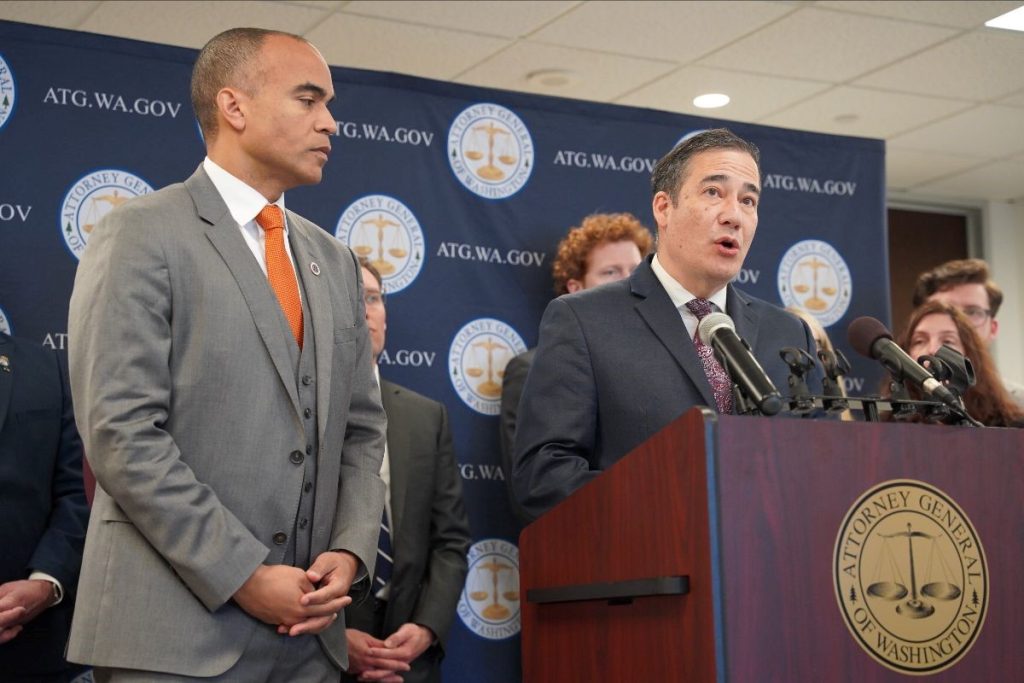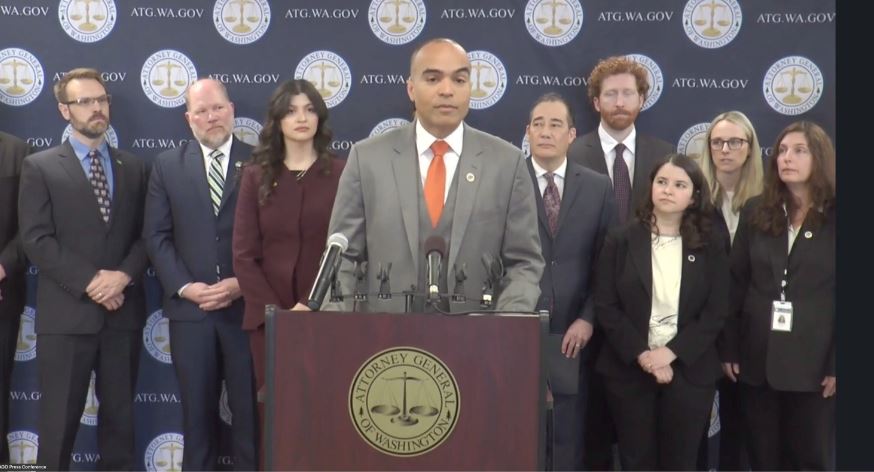OLYMPIA—Washington Secretary of State Steve Hobbs and Attorney General Nick Brown announced a joint lawsuit with the state of Oregon against the Trump administration regarding an elections and voting rights executive order issued March 25

At a press conference in Seattle on April 4, Secretary Hobbs and Attorney General Brown outlined the ways the executive order attempts to control Washington’s election processes. The lawsuit seeks to declare most provisions of the order unconstitutional and prevent the federal government from implementing or enforcing it.
“As our state’s chief elections officer, I will not support measures that suppress Washington’s voters under the guise of security, especially when other measures being taken by this administration leave our systems more vulnerable to real threats from foreign adversaries,” wrote Secretary Hobbs in a statement following Friday’s presser.
The state’s lawsuit argues, the executive order “harms States by purporting to override our sovereign laws governing the counting of votes and voter registration, imposing substantial costs on States to change state voting system and laws, and disenfranchising hundreds of thousands of State residents.”
The U.S. Constitution’s Elections Clause gives states the authority to run their own elections, with exceptions for actions by Congress the Attorney General’s Office states and they also argue that the executive order violates the National Voter Registration Act and the Help America Vote Act by unfairly making it harder to vote.
The order mandates documentary proof of U.S. citizenship on the National Voter Registration Form and Federal Post Card Application, which is used by military and overseas voters. Washington residents who do not have a U.S. passport or enhanced driver’s license likely will not have a qualifying document. The state argues that this requirements risk disenfranchising eligible U.S. citizens, including those from historically unrepresented communities.
“Mandating documentary proof of citizenship in order to register to vote would disenfranchise eligible voters – especially seniors, low-income individuals, and naturalized citizens – who may not have easy access to passports or other acceptable, but potentially costly, documents,” wrote Secretary Hobbs in a statement following Friday’s presser.
According to the executive order, only ballots received no later than Election Day will be eligible to be legally counted—18 states, including Washington and Oregon, accept ballots postmarked no later than Election Day. In the 2024 General Election alone, more than 250,000 Washington ballots postmarked on time arrived after Election Day, according to Secretary Hobbs.
By continuing to process ballots in accordance with Washington state’s laws—those after Election Day—Washington risks losing future funding from the Election Assistance Commission and facing enforcement action by the Department of Justice
Lastly, the executive order directs a federal review of state voter list maintenance practices under the National Voter Registration Act, something Washington already does thoroughly and in compliance with federal law. That review will be led by the Department of Homeland Security and the newly formed DOGE.

“American democracy has given agency to the oppressed, hope to the weary, and belief that our society can work for everyone,” Attorney General Brown said Friday. “These truths appeal to most people, but not to a bully and an authoritarian. Donald Trump fears what he can’t control. He only feels safe when he has our rights under his thumb.”
California, in 1978, became the became the first state to allow voters to apply for an absentee ballot without having to provide a specific reason for not being able to vote in person on Election Day. This was called “no-excuse absentee balloting.”
In 1995, Oregon became the first state to conduct a federal primary election entirely by mail. Washington followed with the November 8, 2011, election and then Colorado starting with the November 4, 2014, general election
Hawaii then implemented all-mail voting for all elections, including federal, starting with the August 8, 2020, primary election, under Act 136 (2019). California, Nevada and Vermont followed Hawaii’s lead start with the November 8, 2022, General Election.
Other states have implemented no-excuse absentee voting (where voters can request a mail ballot without a specific reason) at various points, but they do not conduct all elections by mail.
Author: Mario Lotmore













2 Responses
I’m getting my name changed back to my original name and replacing all my documents so that I’ll be able to vote if the pass the SAVE act. Trump and his goons are disgusting.
Clearly you’re in support of voter fraud, otherwise there would be no objection to common sense actions to protect legal voters and voting integrity; something the Democrats object to regularly. Thank GOD that we have adults back in the White House as Trump is looking out for all Americans.